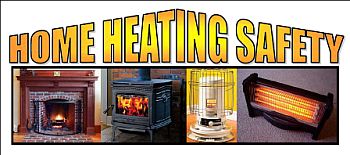 In light of recent tragic house fires across the state, Indiana State Fire Marshal Jim Greeson, the Red Cross, the Indiana Utility Regulatory Commission (IURC) and Indiana Housing and Community Development Authority (IHCDA) are reaching out to Hoosiers in hopes of preventing more deadly house fires.
In light of recent tragic house fires across the state, Indiana State Fire Marshal Jim Greeson, the Red Cross, the Indiana Utility Regulatory Commission (IURC) and Indiana Housing and Community Development Authority (IHCDA) are reaching out to Hoosiers in hopes of preventing more deadly house fires.
Home fires occur more often in winter than in any other season, and alternative heating sources, such as space heaters, are involved in roughly one out of every six of those fires. Greeson is advising Hoosiers to strongly consider other options before using alternative equipment, but if it’s necessary, take precautions.
Heating Assistance
If the source of a home’s heat – gas or electric – is turned off or in danger of being turned off, consider heating assistance first. The IURC reminds customers who are having difficulty paying their bills to contact their utility company as soon as possible to see what payment options or assistance may be available.
Citizens may also reach out to find assistance through programs like the federally funded Energy Assistance Program (EAP) or other organizations, such as social service agencies and faith-based groups. The Indiana Housing and Community Development Authority (IHCDA) administers EAP through local community action agencies. Learn more about EAP and find an office near you at in.gov/ihcda. For a list of local contacts, visithttp://bit.ly/2hcK4eE.
By Indiana law, utilities are prohibited from disconnecting customers between December 1 and March 15 if the customer is receiving help from EAP or has formally applied for the program at their local EAP office and provided the utility with written proof. If your utilities are past due before December 1 or after March 15, your services may be disconnected.
Long Underwear, Insulation and Other Options
Consider other options before using space heaters and other alternative heating. Some other options include:
§ Long underwear. It might sound silly. It might seem too simple, but this will reduce bodily heat loss and enhance warmth and comfort. One layer of thermal long underwear can allow for a savings on heating costs. And, personal insulation can be much cheaper than home insulation. An article in Low Tech Magazine (lowtechmagazine.com) cites an engineering study mentioning the energy saving advantages to wearing layers of clothes. After all, each person’s body is a human furnace, generating heat.
§ Caulk can stop drafts. It decreases heat loss, but also lessens air movement. Fewer drafts can help with bodily warmth.
§ Move while inside. Work out, dance, clean or simply stand and move.
§ Bake cookies, cake, pie or cook dinner. Having the oven on will help with residual heat. But don’t use the stovetop or oven to heat a home.
Space Heaters and Other Alternative Heating
Space heaters and other alternative heating should be avoided if at all possible.
If space heaters and other alternative heating solutions need to be used, Fire Marshal Greeson says there should be at least a three-foot perimeter around space heaters at all times and away from loose or flammable object such as clothing, curtains, bedding and furniture. Only one space heater should be plugged into each electrical outlet, and should not be left on in an unoccupied room. Refuel kerosene space heaters outside the home, but first let them cool down if they were recently used.
No matter if it’s a space heater, wood stove or fireplace, turn it off or extinguish the fire before going to bed or leaving home.
Appliances, such as a stove or oven, should never be used for heating. Using these appliances as a heating option can lead to carbon monoxide poisoning.
Smoke Alarms
Working smoke alarms are important to have year round, but they can be especially important in the winter months with the added risk of alternative heating sources, such as space heaters and fireplaces. According to the Red Cross, families have as little as two minutes to safely escape a burning home, and having a working smoke alarm can double a person’s chance of surviving.
“In this country, seven people lose their lives every day from a home fire,” said Duchess Adjei, Regional Communication Director, for the American Red Cross. “Home fires can be a deadly threat because they happen so quickly. We urge everyone to become aware of what they should do to prevent a fire in their home.”
Fire Marshal Greeson said, “Test your smoke alarm to make sure it works. Even if it responds correctly, if you don’t remember the last time you changed your batteries, do it today. If you don’t have a smoke alarm, buy one and install it. If you don’t have the funds, contact your local fire department, Red Cross or other service agency to see if one can be provided.”
The Indiana chapters of the Red Cross have smoke alarm programs for those who cannot afford to purchase them or are physically unable to install them. Call 1-888-684-1441 or a local Red Cross chapter to make an appointment to test existing smoke alarms and/or install free home alarms. Learn more about the Red Cross Home Fire Campaign by visiting redcross.org/local/Indiana/home-fire-campaign.
For more information on fire safety, including alternative heating safety, visit GetPrepared.in.gov.














